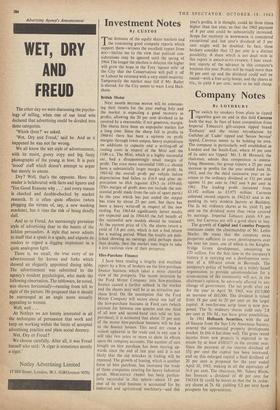Investment Notes
By CUSTOS TBE firmness of the equity share markets and the continuing good company reports which support them—witness the excellent report from anc—incline me to the view that political con- siderations may be ignored until the, spring of 1964. The longer the election is delayed, the higher will grow the hope in the Tory 'square mile' of the City that the Conservatives' will pull it off or Labour be returned with a very small majority. Temporarily the market may fall if Mr. Butler is elected, for the City seems to want Lord Hail- sham.
British Motor
Next month BRITISH MOTOR will be announc- ing their results for the year ending July and the market is expecting a good recovery in profits, allowing the 20 per cent dividend to be covered by a reasonable, if not generous, margin. The shares have been an unpopular market for a long time. Since the sharp fall in profits in 1960-61 there has been a squeeze on profit margins through lower output, heavy expenditure on additions to capacity and a writing-off of tooling costs in respect of the Mini and the 1,100 c.c. The Mini, which is a highly successful car, had a disappointingly small margin of profit. The even more successful 1100 c.c. should have a substantially larger margin of profit. In 1961-62 the overall profit per vehicle before depreciation had fallen to £16.9 and after de- preciation to £6.6 (against £39.5 in- 1959-60). (This margin of profit does not include the sub- stantial profit made from the sale of spare parts.) In the year which has just ended the output has risen by about 25 per cent, but there has been a heavy write-off in respect of the new tooling. For 1963-64 significantly better results are expected and in 1964-65 the full benefit of - the successful new models should be realised. At the current price of 17s. the shares return a yield of 5.8 per cent, which is not a bad return for a waiting period. When the results are pub- lished showing an earnings yield perhaps more than double, then the market may begin to take a less cautious view of their prospects.
Hire-Purchase Finance
I have been reading a lengthy and excell6nt report by a firm of brokers on the hire-purchase finance business which takes a more cheerful view of the prospects. The recent incursion by the Ford Motor Company into hire-purchase finance caused a further setback in the market and the shares may well be at an attractive pur- chase level. On the assumption that the Ford Motor Company will secure about one half of the hire-purchase business in Ford. cars (which account for between one quarter and one third of all new and second-hand cars sold on hire purchase), it is estimated that about 15 per cent of the motor hire-purchase business will be lost to he finance houses. This need not cause a violent upheaval in the trade and in any case it will take two years or more to show its effects upon the company accounts. The number of cars bought on hire purchase has been moving up- wards since the end of last year and it is not likely that the old mistakes in trading will be repeated. The growth of leasing, which is another form of hire purchase, has increased the trade of those companies catering for heavy industrial goods. MERCANTILE CREDIT has been particu- larly successful in .this sphere—about 15 per cent of its total business is accounted for by industrial and agricultural machinery—and this year's profits, it is thought, could be three times higher than last year, so that the 1962 payment of 8 per cent could be substantially increased. Scope for recovery in BOWMAKER is considered exceptional and last year's dividend of 5 per cent might well be doubled. In fact, these brokers consider that 12 per cent is a distinct possibility. A share which is not dealt with in this report is ANGLO-AUTO FINANCE. I hear excel- lent reports of the advance in this company's business this year. Profits will be much more than 50 per cent up and the dividend could well be raised—with a free scrip bonus, and the shares at I Is., to yield 4 per cent, seem to be still cheap.


































 Previous page
Previous page